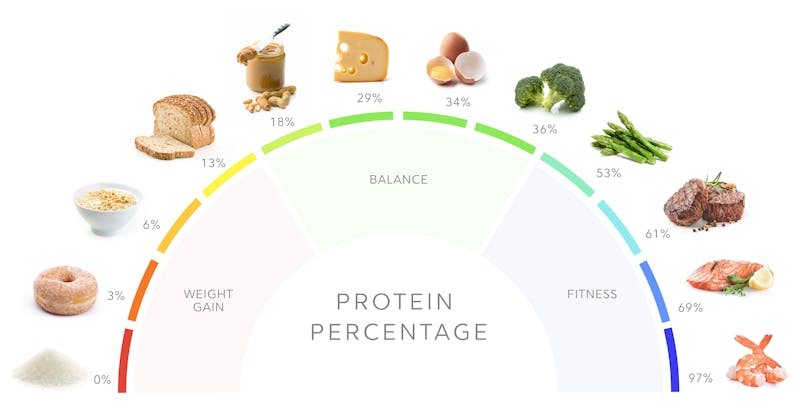
What is Protein?
Protein is a macronutrient that plays a vital role in many bodily functions. It comprises smaller units called amino acids, which are linked in long chains. Body tissues and organs rely on proteins for structure, function, and regulation. They are also crucial for the growth, repair, and production of hormones and enzymes.
Why & How Much is Required?
Protein is a vital nutrient for building and maintaining muscle mass. The amount of protein you need to build muscle depends on a variety of factors, including your age, sex, body weight, and activity level.
According to the Recommended Dietary Allowance (RDA), 0.8 grams of protein per kilogram of body weight should be consumed each day. This is the minimum amount of protein needed to meet the basic nutritional needs of most adults. However, if you want to build muscle, you will probably need more protein than the RDA.
For strength training, it is recommended to consume between 1.6 to 2.2 grams of protein per kilogram of body weight per day. This is equivalent to about 0.73 to 1 gram of protein per pound of body weight. For example, a person weighing 150 pounds (68 kg) should consume between 100 and 150 grams of protein daily.
There are different ways to increase your protein intake. Eating more protein-rich foods, such as meat, fish, dairy, and beans, is one option. Protein supplements, such as whey protein powder, can also be a convenient way to increase your protein intake.
Protein consumption that exceeds your body’s needs will not lead to muscle growth. Excess protein is broken down and used for energy or stored as fat. A healthy diet that includes carbohydrates and healthy fats supports muscle growth and recovery.

Here are some ways to increase protein in take:
-
Incorporate more protein-rich foods into your diet. These include meat, fish, dairy, beans, and nuts.
-
Add a protein supplement to your meals or snacks, such as whey protein powder.
-
Eat more eggs. They are an excellent source of protein and can be cooked.
-
Try incorporating more plant-based protein sources such as lentils, chickpeas, and quinoa into your diet.
-
Snack on Greek yoghurt, cottage cheese or protein bars between meals.
-
To make smoothies or oatmeal more filling, add a scoop of protein powder.
-
Include high-protein snacks such as nuts and seeds in your diet.
-
Get enough protein with every meal, whether it’s breakfast, lunch, or dinner.
It’s important to note that it’s not only about increasing protein intake but also maintaining a balanced diet and regular exercise routine to achieve muscle growth. Consult with a dietitian or a doctor before changing your diet.

Strength Training
Besides consuming enough protein, strength training is crucial for building muscle. Raining, such as weight-lifting and bodyweight exercises, helps to stimulate muscle growth by breaking down muscle fibres, which then repair and grow back stronger.
Conclusion
In summary, it is important to consume enough protein and engage in strength training to build muscle. The amount of protein needed varies depending on your individual needs, but it is recommended to consume between 1.6 to 2.2 grams of protein per kilogram of body weight per day. Eating a variety of protein-rich foods, using protein supplements like ProBliss, and maintaining a balanced diet, along with regular exercise, is the key to building muscle.
ProBliss is a refreshing dose of wellness of high-concentration protein with goodness of herbs, superfoods and multi-nutrients. Enriched with herbs like Shatari, Tulsi, Moringa, Piperine & Curcumin with the intelligent combination of superfoods and herbs that help bridge daily nutritional requirements & provide strength and endurance to perform everyday tasks effectively. ProBliss is the way to an active and healthy lifestyle.






